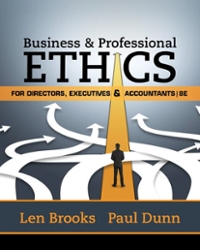Pierre Duhaime retired as CEO of SNCLavalin on March 26, 2012, a post that he had held
Question:
Pierre Duhaime “retired” as CEO of SNCLavalin on March 26, 2012, a post that he had held since 2009 following over 20 years of employment at the company. He did so, because of his role in approving
\($56\) million in payments in contravention of the company’s policies.1 Police were called in to help trace and recover the payments following an Independent Review by Stikeman Elliott LLP, a prominent law firm. The story originated at a news conference by Board Chair, Gwyn Morgan, and a Press Release2 by the company on March 26.
According to the Press Release, two payments were initiated by Riadh Ben Aissa, the Executive VP of Construction, for which “the nature of the services or actions undertaken by, or the true identity of any presumed agent” could not be established.
One payment made in 2011 was for \($33.5\) million. When the required signatories (the Chairman of SNC-Lavalin International and the CFO) refused to authorize the payment, the CEO, Mr. Duhaime, was approached and he signed the authorization based upon the understanding that
“it would help secure work in respect of Project A.” Project A was not identified in the Independent Review. For the second payment incident regarding Project B, the story is much the same except that is was initiated in 2009 for \($30\) million, with payments aggregating \($22.5\) million being made in 2010 and 2011. Mr. Aissa and someone in his division improperly approved these expenditures. “In 2010, the CFO was told at a meeting with the CEO and Mr. Aissa that an agent had been hired on Project B and that its fees would be charged to other projects. The CFO objected to this at the meeting.”
These payments were detected as anomalous in an analysis in February 2012, and were then “reported to the Senior Vice-
President and Controller of the Company”
who objected to the payments.
The Independent Review concluded that the company’s Code of Ethics and Business Conduct and its Agent’s Code had been breached, but neither code required reporting of a breach or suspected breach, nor did it find the failure to report a breach of the code. The company’s Whistleblower Policy also did not impose any obligation to report. Not surprisingly, the Independent Review recommended changes to these codes, and increased attention to management override and improvement and enforcement of controls.
In addition to the questionable payments reported above, there is evidence that SNC-Lavalin was involved with the Gadhafi regime and family in Libya. The company reportedly3 hired Cyndy Vanier to go on a fact-finding mission to Libya and bring Gadhafi’s son Saadi to Mexico, where she was incarcerated. On March 28, 2012, it became known that, when the company left Libya before the revolution of 2011, it left \($22.9\) million in cash in Libyan banks, and it hopes the money will be available if and when it returns to Libya.4 From a governance perspective, the Board failed to ensure that company policies were adequate to ensure ethical and legal conduct, and that the actions of Mr. Aissa and Mr. Duhaime speak to a lack of ethical tone at the top.
SNC-Lavalin faced legal action under the Canadian Corruption of Foreign Public Officials Act.
Questions:-
1. From a governance perspective, what can the Board of Directors do to make sure that the company’s policies and procedure are adequate to ensure ethical and legal conduct by its employees?
2. Mr. Aissa and Mr. Duhaime were not demonstrating strong ethical leadership. What can a firm do to improve its ethical tone at the top?
3. Is it appropriate for a company to do business in a country with an oppressive regime? Why and why not?
4. If the decision ismade to do business in a country with an oppressive regime, what limitations that should be put in place by the company to guide its employees against unethical involvement?
Step by Step Answer:

Business And Professional Ethics
ISBN: 9781337514460
8th Edition
Authors: Leonard J Brooks, Paul Dunn





